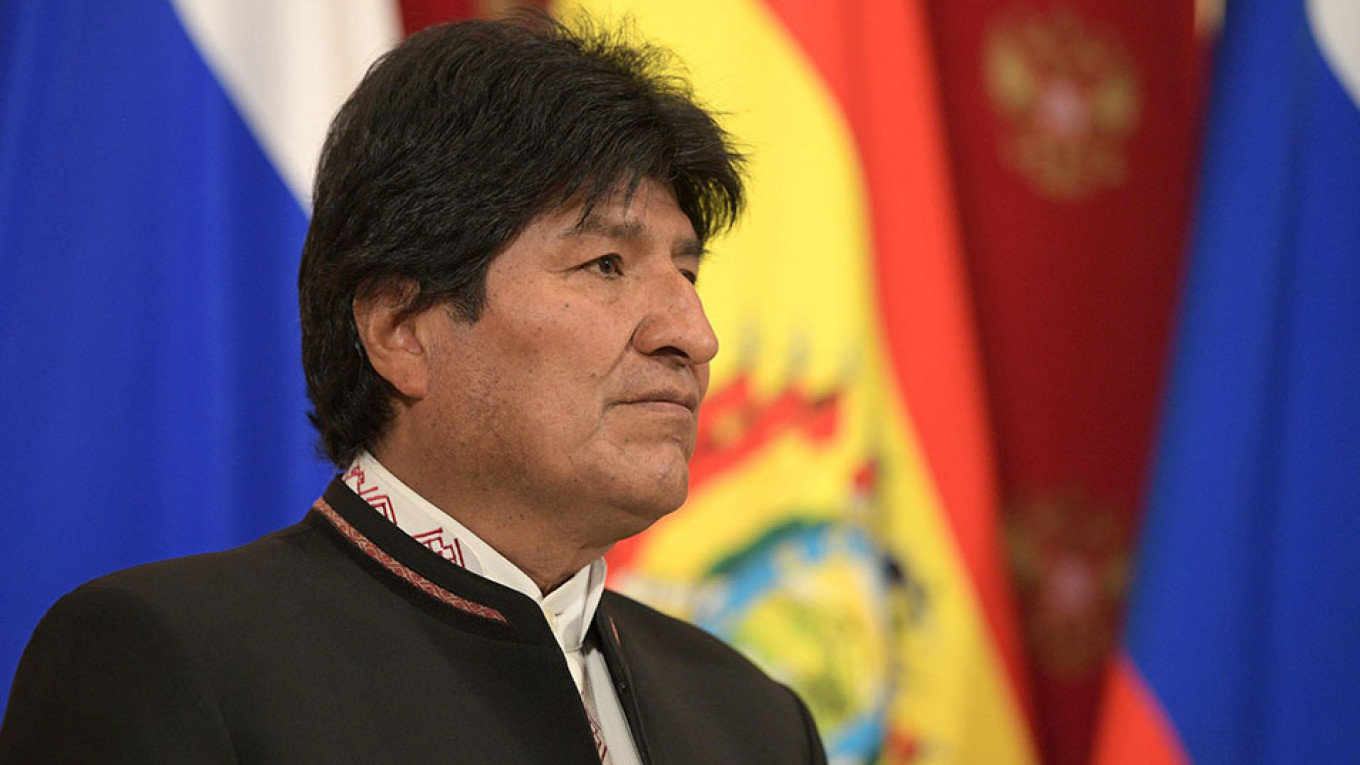The people of Bolivia have rid themselves of a president who had brazenly outstayed his welcome, but Russians rejoicing over the departure of Evo Morales — and particularly those who are critical of the current authorities — should stop and think seriously about the threat these events in a far-off country pose to them.
Framing the issue this way should not appear at all unjust or far-fetched. The swift collapse of the Morales regime has been a textbook example of everything that the Kremlin has considered signs of a “color revolution” since the mid-2000s: unsuccessful elections, unrest on the streets, the armed forces going over to the protesters, the readiness of the government to hold fresh elections and its swift collapse.
In Kremlin's view, the world has witnessed its latest “color revolution,” and this means it is necessary to increase vigilance and draw conclusions from Morales’ mistakes, to ensure that the Bolivian scenario will not occur in Russia.
So what conclusions will an alarmed Kremlin draw from the collapse of the Evo Morales regime?
Firstly, no real or truly powerful opponents should be allowed to participate in elections under any circumstances. Morales was forced to resort to the falsifications that ruined him because he had insufficient votes to win outright victory without going to a second round.
That is, his opponents, the country’s former president Carlos Mesa, was strong enough to reach a run-off at the least, and potentially to win it. If there had been no strong rival, Morales would have won in the first round and the situation would have been different.
Furthermore, in no circumstances should faith be placed in winning an honest victory in elections, even if the leader has been wildly popular relatively recently. The only thing that can be relied upon is well-organised falsification and loyal security forces.
The loyalty of the military remains paramount, and this is the most important factor. The theory that by going out onto the streets people are capable of ending a dictatorship by themselves, and that numbers are the key, works only in Europe or in countries where people in uniform have some kind of respect for the population.
In Venezuela, as we are seeing, the local security forces deeply despise their fellow citizens and are remaining faithful to Nicolas Maduro. And no matter how many hundreds of thousands or even millions the Venezuelan opposition bring out onto the street, it seems impossible to topple Hugo Chavez’s successor.
In Bolivia, from the point of view of self-preservation, Morales simply didn’t work on the security forces enough: in 14 years in power he was unable to get rid of the sticklers, those for whom “trifles” such as the kind of constitution and the results of elections are more important than saving the president.
After Bolivia, all suggestions that there can be some kind of competitive elections in Russia or that there might be some kind of weakening of the regime during a transition of power should be treated with even greater skepticism.
Things are more likely to go the other way: when compared to the far harsher and more prolonged confrontation with a significant part of the population and elite endured by the dictatorships of Bashar al-Asaad and Maduro, the rapid ousting of Morales hands all the trump cards to adherents of harsh police tactics and tough responses.
These are people who are convinced that only someone who is willing to spill blood and has surrounded themselves with loyal security forces that will shoot protesters if necessary can remain in power, even in conditions of economic collapse, external blockade and civil war — not to mention rigged or even lost elections.
Even before the news came in from Bolivia, it was extremely naïve to hope for any kind of liberalization in Russia, and we should now prepare for a new tightening of the screws in all areas of life and heightened suspicion.
Is everybody really ready to go all the way not only in word, but in deed as well?
The only consolation is that it is only in a real crisis that it will become clear to what lengths people are really prepared to go. And the screws cannot be tightened endlessly — in Russia they’re screwed almost all the way in already, even without a Bolivia.
A Russian version of this article first appeared in Vedomosti.
A Message from The Moscow Times:
Dear readers,
We are facing unprecedented challenges. Russia's Prosecutor General's Office has designated The Moscow Times as an "undesirable" organization, criminalizing our work and putting our staff at risk of prosecution. This follows our earlier unjust labeling as a "foreign agent."
These actions are direct attempts to silence independent journalism in Russia. The authorities claim our work "discredits the decisions of the Russian leadership." We see things differently: we strive to provide accurate, unbiased reporting on Russia.
We, the journalists of The Moscow Times, refuse to be silenced. But to continue our work, we need your help.
Your support, no matter how small, makes a world of difference. If you can, please support us monthly starting from just $2. It's quick to set up, and every contribution makes a significant impact.
By supporting The Moscow Times, you're defending open, independent journalism in the face of repression. Thank you for standing with us.
Remind me later.








